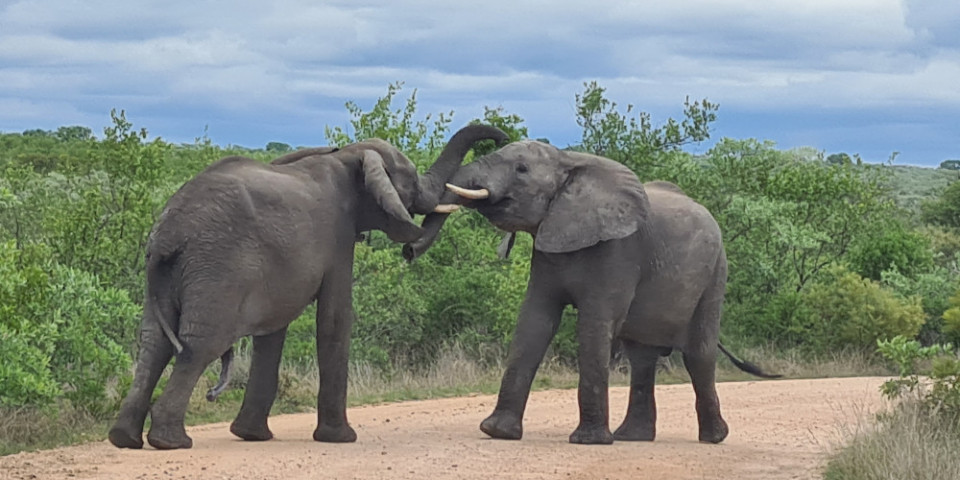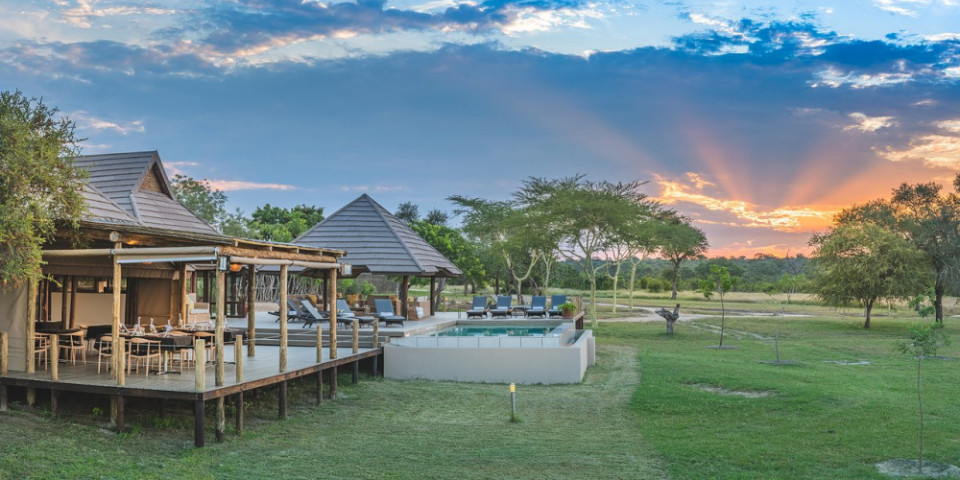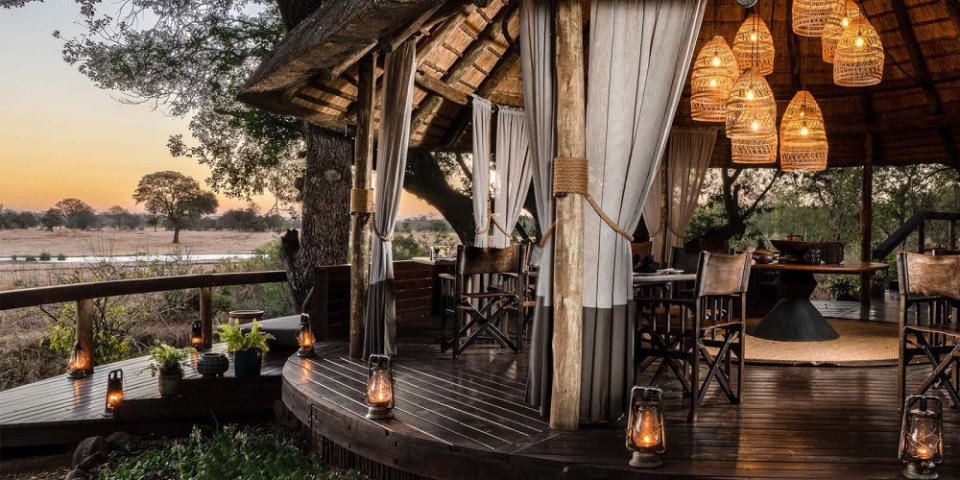Tour Length
Rates in USD $ – Change Currency
Per person, excl. international flightsOperator Rating
Other Tour Features
Filter by Operator
Filter by Accommodation
Sabi Sands Safari Tours & Holidays
One of Africa’s most prestigious Big Five safari destinations, Sabi Sand Game Reserve is famed for offering thrilling close-up viewing of lion, leopard and other large carnivores. It forms part of the same vast cross-border ecosystem as the Kruger National Park, with which it shares an unfenced 50km/30mi border, allowing for free movement of wildlife. The reserve is named after the Sabie River, which forms an important year-round source of drinking water, and a seasonal tributary called the Sand. Although Sabi Sands is managed as a single ecological unit, it actually comprises several different properties, including the five-star likes of Londolozi, Singita and Sabi Sabi, that function independently of each other in terms of tourism.
-
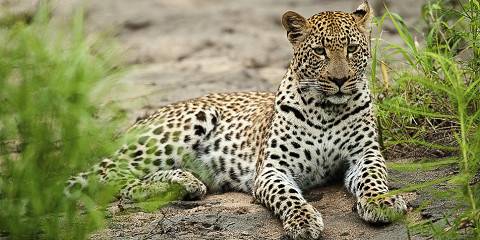
4-Day Sabi Sand Safari with Arathusa Safari Lodge
$1,940 pp (USD)
South Africa: Private tourLuxuryLodge
You Visit: Hoedspruit (Start), Sabi Sands (Greater Kruger), Hoedspruit (End)

Indigo Safaris
4.9/5 – 159 Reviews
-

4-Day Sabi Sands Luxury Fly-in Safari
$5,546 to $6,112 pp (USD)
South Africa: Private tourLuxury+Lodge
You Visit: Johannesburg (Start), Sabi Sabi GR (Sabi Sands), Johannesburg (End)
_4618_5ebbb703a4b33.gif)
Ranger Buck Safaris
5.0/5 – 51 Reviews
-
Best Seller
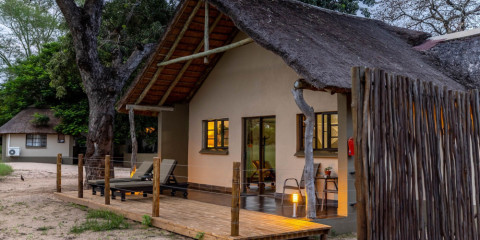
4-Day Sabi Sands Umkumbe Safari Lodge
$1,285 pp (USD)
South Africa: Shared tour (max 10 people per vehicle)LuxuryLodge
You Visit: Johannesburg (Start), Sabi Sands (Greater Kruger), Umkumbe GR (Sabi Sands), Johannesburg (End)

MoAfrika Tours
4.9/5 – 2,291 Reviews
-
Top Rated Operator

4-Day Sabi Sand Reserve Luxury Safari, Greater Kruger
$3,150 to $3,299 pp (USD)
South Africa: Private tourLuxuryBush Camp
You Visit: Skukuza (Start), Sabi Sands (Greater Kruger), Kruger NP, Kruger (End)

Wayfairer Travel

4.8/5 – 184 Reviews
-

5-Day Experience - Kruger Park & Private Game Reserve
$1,834 pp (USD)
South Africa: Shared tour (max 9 people per vehicle)LuxuryLodge & Private Villa
You Visit: Johannesburg (Start), Kruger NP, Sabi Sands (Greater Kruger), Johannesburg (End)

Elephant Herd Tours & Safaris
4.9/5 – 160 Reviews
-
Top Rated Operator
![7-Day Best of Both Worlds - Madikwe & Sabi Sands Safari]()
7-Day Best of Both Worlds - Madikwe & Sabi Sands Safari
$7,166 pp (USD)
South Africa: Private tourLuxuryLodge
You Visit: Johannesburg (Start), Madikwe GR, Sabi Sands (Greater Kruger), Johannesburg Airport (End)

Discover Africa Safaris
5.0/5 – 525 Reviews
-

4-Day Luxury Sabi Sands Safari & Treehouse Sleep-out
$10,945 pp (USD)
South Africa: Private tourLuxury+Lodge
You Visit: Skukuza (Start), Lion Sands GR (Sabi Sands), Skukuza (End)

Viatu
4.9/5 – 93 Reviews
-
Top Rated Operator
![5-Day Kruger and Greater Kruger Semi-Exclusive Safari]()
5-Day Kruger and Greater Kruger Semi-Exclusive Safari
$1,236 pp (USD)
South Africa: Private tourBudgetLodge & Tented Camp
You Visit: Johannesburg (Start), Kruger NP, Panorama Route (Highlight), Sabi Sands (Greater Kruger), Johannesburg (End)

Safari With Us
4.9/5 – 246 Reviews
-
![4-Day Kruger & Sabi Sand Rustic Safari Camp]()
4-Day Kruger & Sabi Sand Rustic Safari Camp
$933 pp (USD)
South Africa: Shared tour (max 10 people per vehicle)
Mid-range Tented CampYou Visit: Hazyview (Start), Sabi Sands (Greater Kruger), Kruger NP, Hazyview (End)

SafariLife
5.0/5 – 21 Reviews
-
![3-Day Sabi Sabi Bush Lodge Safari]()
3-Day Sabi Sabi Bush Lodge Safari
$2,811 pp (USD)
South Africa: Private tourLuxury+Lodge
You Visit: Skukuza (Start), Sabi Sabi GR (Sabi Sands), Skukuza (End)

Africa Incoming
4.7/5 – 14 Reviews
-
![6-Day Luxury Kruger NP & Victoria Falls Safari]()
6-Day Luxury Kruger NP & Victoria Falls Safari
$3,648 to $4,246 pp (USD)
South Africa & Zimbabwe: Private tourLuxuryLodge & Hotel
You Visit: Johannesburg (Start), Sabi Sands (Greater Kruger), Victoria Falls (End)

Off2Africa Travel
5.0/5 – 145 Reviews
-
Top Rated Operator

4-Day Sabi Sands Nkorho Lodge Safari
$1,966 to $2,258 pp (USD)
South Africa: Shared tour (max 9 people per vehicle)LuxuryLodge
You Visit: Johannesburg (Start), Sabi Sands (Greater Kruger), Johannesburg (End)

The Kruger Safari Co.
5.0/5 – 210 Reviews
-
![9-Day Classic Sabi Sand, Kruger and Cape Town Safari]()
9-Day Classic Sabi Sand, Kruger and Cape Town Safari
$3,497 to $3,710 pp (USD)
South Africa: Private tourLuxuryLodge & Tented Camp
You Visit: Cape Town (Start), Cape Peninsula, Sabi Sands (Greater Kruger), Klaserie NR (Greater Kruger), Johannesburg (End)

Explore and Travel Africa
5.0/5 – 46 Reviews
-
Best Seller
![8-Day Kruger Safari & Cape Town]()
8-Day Kruger Safari & Cape Town
$3,399 to $3,520 pp (USD)
South Africa: Private tourLuxuryLodge & Hotel
You Visit: Hoedspruit (Start), Timbavati NR (Greater Kruger), Sabi Sands (Greater Kruger), Cape Town (End)

Pembury Tours
5.0/5 – 468 Reviews
-
![7-Day Big5 Sabi Sand Greater Kruger & Phinda Reserve]()
7-Day Big5 Sabi Sand Greater Kruger & Phinda Reserve
$6,050 to $6,534 pp (USD)
South Africa: Private tourLuxuryLodge
You Visit: Nelspruit (Start), Sabi Sands (Greater Kruger), Phinda GR, Richards Bay (End)

African Safari Guru
5.0/5 – 61 Reviews
-

3-Day Sabi Sand - Umkumbe Safari Lodge Riverside
$635 pp (USD)
South Africa: Private tourLuxuryLodge
You Visit: Nelspruit (Start), Sabi Sands (Greater Kruger), Nelspruit (End)

Traipsing Africa's Safaris and Tours
5.0/5 – 118 Reviews
-
![3-Day Sabi Sands Luxury Safari Retreat in Premier Lodge]()
3-Day Sabi Sands Luxury Safari Retreat in Premier Lodge
$1,621 to $1,683 pp (USD)
South Africa: Private tourLuxuryLodge
You Visit: Hoedspruit (Start), Sabi Sands (Greater Kruger), Hoedspruit (End)

Knap Tours
5.0/5 – 13 Reviews
-
![3-Day Stay at Umkumbe Safari Lodge, Sabi Sands]()
3-Day Stay at Umkumbe Safari Lodge, Sabi Sands
$708 pp (USD)
South Africa: Private tourLuxuryLodge
You Visit: Skukuza (Start), Umkumbe GR (Sabi Sands), Skukuza (End)

JourneyTo
5.0/5 – 20 Reviews
-
![4-Day Sabi Sand Safari at Umkumbe Bush Lodge]()
4-Day Sabi Sand Safari at Umkumbe Bush Lodge
$1,122 pp (USD)
South Africa: Private tourLuxuryTented Camp
You Visit: Nelspruit (Start), Sabi Sands (Greater Kruger), Nelspruit (End)

Indigo Safaris
4.9/5 – 159 Reviews
-
Top Rated Operator

4-Day Sabi Sabi Bush Lodge Safari
$4,061 pp (USD)
South Africa: Shared tour (max 10 people per vehicle)Luxury+Lodge
You Visit: Johannesburg (Start), Sabi Sands (Greater Kruger), Johannesburg (End)

MoAfrika Tours
4.9/5 – 2,291 Reviews
6 Questions About Sabi Sands Safaris

Answered by
Philip Briggs
Philip Briggs is an Africa-specialized travel writer who lives in South Africa. He has visited Sabi Sands and other parts of Greater Kruger on numerous occasions, and is the author of several related guidebooks, including ‘The Rough Guide to Game Parks of South Africa’.› More about Philip
6 Questions About Sabi Sands Safaris
 Philip Briggs
Philip Briggs
How does a safari in Sabi Sands compare to a safari in Kruger?
“Ecologically, Sabi Sands is similar to bordering parts of Kruger, and it protects the same wildlife. However, the two offer very different experiences, specifically that Sabi Sands feels far more exclusive than Kruger, and wildlife viewing is more intense. To elaborate, where Kruger is serviced by a mid-range network of state-run rest camps, Sabi Sands is dominated by small, private five-star lodges and camps. The vast majority of these provide full holiday packages inclusive of world-class cuisine, guided game drives, bushwalks and, in many cases, drinks and laundry. In addition, where Kruger’s road network is open to anybody who pays the entrance fee, Sabi Sands can be explored only on private guided game drives in open 4x4s. Game drives in Kruger must stick to designated roads, and private vehicles are required to return to camp by nightfall. By contrast, off-road driving is permitted in Sabi Sands, and afternoon game drives invariably turn into night drives. All this, together with the high standard of guiding and tracking, makes Sabi Sands far more reliable than Kruger for spotting the likes of lion, leopard and cheetah, and for providing great photographic opportunities. All things considered, Sabi Sands will be preferable to Kruger for most first-time safari-goers. That said, it is more expensive than Kruger, and independent-minded travelers might prefer the unpackaged feel of a self-drive Kruger safari.”
1What can I expect from a Sabi Sands safari?
“Most Sabi Sands safaris follow a similar daily routine. Usually you’ll arrive in time for a light lunch on the balcony, often in view of a river or waterhole that attracts thirsty animals in the heat of the day. After a post-lunch siesta, you’ll assemble for afternoon tea, typically about two hours before sunset. You’ll then head out on a guided afternoon game drive, usually in a sturdy customized 4x4 with open sides and seating for between four and nine guests. Guides and trackers will often follow up on sightings from earlier that day, in particular lions, which seldom move far between midmorning and late afternoon. But they’ll also keep an eye and ear open for other wildlife, fresh footprints and alarm calls that might indicate a big cat is on the prowl. At dusk it’s customary to stop for sundowner drinks and snacks, before continuing on a night drive. The tracker will use a spotlight to try to locate nocturnal creatures, such as leopards, bush babies, genets, elephant shrews and small carnivores. You’ll return to the lodge or camp for dinner, which often consists of a buffet braai (barbecue) in a rounded rustic wooden shelter known as a boma. Don’t stay up too late, and think twice about that nightcap. You’ll be up again before dawn to go on a game drive in the early morning, which is often the most productive time for seeing big cats in action. Expect a short coffee break sometime on the morning game drive, before heading back to camp for a late breakfast or brunch.”
2What should I consider when choosing between different properties in the reserve?
“Property size and location are two factors to consider when choosing your Sabi Sands safari. Property size is possibly the most important factor for making the best of a holiday in Sabi Sands. Properties within the reserve break down into two broad types. The first consists of large blocks of land where game drives take place mostly or entirely on the one property, rather than traversing into neighboring ones. The second consists of small blocks of land that have extensive cross-traversing agreements with other small properties. In our experience you are best off on a property sufficiently large that no significant cross-traversing takes place. You will see fewer other vehicles than you would on a smaller property, and are more likely to be able to stick with good sightings without having to make way for other vehicles. The premier properties in this regard include Singita, Londolozi and Sabi Sabi. And none of these are as large or as free from traversing issues as MalaMala, a separately managed reserve bordered by Kruger to the east and Sabi Sands on the other three sides. When it comes to general location, avoid the most westerly block of properties, which tend to be small and relatively densely trafficked. If you visit in the dry winter months, an important consideration is Sabie or Sand River frontage. Properties away from both rivers may be rather deserted of wildlife during periods of drought.”
3Which animals can I expect to see?
“Sabi Sands prides itself on the quality of its big-cat sightings, and over the course of a few days, you can be reasonably confident of long encounters with all the Big Five. Lion and leopard are as good as certain, and there are few other places where leopards are so relaxed around vehicles. Other carnivores regularly seen in Sabi Sands include cheetah, black-backed jackal, spotted hyena, common genet, various types of mongoose and (more unusually) African wild dog. Sabi Sands tours place a strong emphasis on tracking down large carnivores, but you should encounter plenty of other wildlife too. Everyday sightings should include elephant, buffalo, giraffe, zebra, warthog, baboon, wildebeest, greater kudu, impala and various smaller antelope. Depending on access to water, you might also see hippos and crocodiles. The least certain of the Big Five are rhinos, which are less common in Greater Kruger than they were a few years back, due to a combination of commercial poaching and several years of drought. All the same, you’d be unlucky not to see a white rhino in Sabi Sands, but the smaller and more temperamental black rhino is quite scarce. More than 500 bird species are listed for Kruger, and most of these have also been recorded in Sabi Sands. The park is particularly rewarding when it comes to raptors and other large birds that are now scarce outside of protected areas, for instance southern ground hornbill, African fish eagle and Kori bustard.”
4How many days are recommended for a trip to Sabi Sands?
“We recommend a minimum package of 3 days (2 nights) in Sabi Sands, but a 4-day (3-night) trip would be better. This does depend to some extent on your level of interest in wildlife and how important it is to you to see the Big Five. Such is the quality of wildlife viewing in Sabi Sands that even on a 2-day (1-night) trip you stand a fair chance of seeing most of the Big Five. But a longer stay greatly improves your chances of a full house, and it also gives you a bit of time to soak up the unique atmosphere associated with being in the African bush. There is no reason why you couldn’t spend longer than 4 days in Sabi Sands. No matter how long you spend on safari, every day will reward you with fresh sightings and different photographic opportunities. But for someone with an average interest in wildlife, 4 days is probably the ideal balance. It should be noted that a 2-day safari to Sabi Sands will usually include only 1 night in the park, a 3-day safari is only 2 nights, and so on. And since most, if not all, camps and lodges in Sabi Sands offer two game drives per night to guests (one in the afternoon/evening and one in the morning), this means that a 2-day safari incorporates just two game drives (the equivalent of 1 day’s wildlife viewing), while a 3-day safari is effectively the equivalent of 2 days of wildlife viewing, and so on.”
5How much will this safari cost?
“Sabi Sands packages are mostly significantly pricier than Kruger safaris of comparable duration. This is because they are more exclusive, in terms of both accommodation and wildlife viewing. Rates for a 3-day, 2-night safari start at around US$500 per person per night, staying in a relatively basic tented camp (which will still be quite luxurious by most standards). You might be looking at a price in excess of US$1,500 per person per night at the top end of the luxury scale. You can increase this by the same amount for each additional night. If a full Sabi Sands package is beyond your means, you could look at one that combines some time in Kruger with a night or 2 in Sabi Sands. In this instance, we recommend one that visits Kruger first, so you’ll have seen all the more common species of wildlife before you get to Sabi Sands.”
6Sabi Sands Safari Reviews

Stephen is a travel writer and avid conservationist whose work appears in prestigious magazines such as Africa Geographic and Travel Africa.
Big Five Bonanza
Flanking the unfenced western boundary of the Kruger National Park, the Sabi Sand Game Reserve is Southern Africa’s most exclusive and famous wildlife safari destinations. It is also one of the oldest private nature reserves and the...

Emma is an award-winning travel writer for Rough Guides, National Geographic Traveller, Travel Africa magazine and The Independent.
Classic Big Five safaris, with superb leopard-watching
Sabi Sands delivers the classic safari experience on a plate. It’s a prime chunk of wildlife-watching territory tucked up against the southern section of Kruger National Park, with no fences between the two. This feast doesn’t come...
 US
US
Where do I begin! Elephant Plains exceeded our expectations and made or safari trip a dream come true. From the attention to detail in our rooms from the reception and housekeeping teams to the servers and chef for our meals, everything...
 CA
CA
Very experienced spotters that make sure you have the best experience. If you want to see big 5 up close, the Sabi Sand Private Game Reverse does an amazing job of seeing them up close, however due to their focus on the big 5 you might...
It was the best safari I have been on and I have been to Kenya, Tanzania and Kruger before. (not been to Okavango Delta yet, which is probably the pinnacle), but it is the first time I really experienced interaction between all the animals...
 CA
CA
Incredible sightings everyday, beautiful landscapes, saw big five, up and close with the animals on every drive! Part of the greater kruger area and not fully enclosed reserve, with antipoaching efforts underway making it a great choice...

